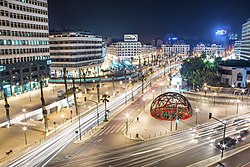United Nations Square (Arabic: ساحة الأمم المتحدة, French: Place des Nations-Unies) is a public square in the center of Casablanca, Morocco. It has been central in the history of Casablanca.
| United Nations Square | |
|---|---|
| ساحة الأمم المتحدة | |
 United Nations Square at night. | |
 | |
| Coordinates | 33°35′42″N 7°37′08″W / 33.5949°N 7.6188°W |
| Designer | Henri Prost |
| Connecting transport | Tramway T1 |
History
editThe area outside the walls of the old medina that is now United Nations Square, used to be the location of the Souq Kbir (سوق كبير), also referred to as le Grand Socco, before French colonization. In 1908, after the French bombardment and invasion of Casablanca, the French commander Charles Martial Joseph Dessigny ordered the construction of a clock tower in the area, which then took the name, Place de l'Horloge, "Square of the Clock". The square was then named Place de France, "Square of France," and the surrounding area was developed by a team of French architects and urban planners chosen by the French Résident général Hubert Lyautey and led by Henri Prost.
The Magasins Paris-Maroc building (1914), constructed by Hippolyte Delaporte and Auguste Perret, was located at the southern end of Place de France.[1][2] in 1915, Hubert Lyautey inaugurated the new Casablanca branch of the State Bank of Morocco was inaugurated on the square's northeastern side.[3][4] The Neo-Mauresque Hotel Excelsior, which remains today, was built in 1916.[5]
As the European ville nouvelle, or "new city," expended eastward of the square, the square evolved from a marketplace to a contact point between the European city and the Casablanca medina, which French colonists described as the "ville indigène."[6]
The clock tower was demolished in 1948, together with several of the square's buildings that stood on the way of the Avenue des Forces Armées Royales, created under the new urban planning proposed by Michel Écochard.[7] The square became a bus station for a period of time in the midcentury. A clock tower imitating the original's design was constructed a short distance closer to the medina in 1993.
The architect Jean-François Zevaco designed the Kora Ardia (كرة أرضية), "Globe," in 1975.[8]
The Casablanca Tramway transformed the square. Work started in 2009, and the first line was inaugurated December 12, 2012.[9]
Access
editThe square is reachable by Line 1 of the Tramway, which stops at United Nations Square Station.
See also
editReferences
edit- ^ Cohen, Jean-Louis (Jan 21, 2020). "Elie Azagury (1918-2009) - le doyen des architectes Marocains". YouTube.
- ^ "Archiwebture — Image en grand format". archiwebture.citedelarchitecture.fr. Retrieved 2020-05-05.
- ^ "Le général Noguès inaugure le nouvel hôtel de la Banque de l'Etat du Maroc" (PDF). Le Petit Marocain. 17 October 1937.
- ^ "Banque D'Etat Du Maroc Casablanca Maroc CPA Postcard 8057". PicClick.
- ^ أرحال, سناء. "هذا تاريخ مجسم "الكرة الأرضية" وهذه خصائص إعادة تأهيله". مشاهد 24 (in Arabic). Retrieved 2019-05-14.
- ^ Cohen, Jean-Louis, 1949- (1998). Casablanca : mythes et figures d'une aventure urbaine. Eleb, Monique, 1945- ... [Paris]: Hazan. ISBN 2850256242. OCLC 406294705.
{{cite book}}: CS1 maint: multiple names: authors list (link) CS1 maint: numeric names: authors list (link) - ^ "Casamémoire : Histoire de l'urbanisme de Casablanca". Casamemoire.org.
- ^ "Casablanca: la Kora Ardia en plein relooking". Al HuffPost Maghreb (in French). 2017-04-14. Archived from the original on April 15, 2017. Retrieved 2019-05-14.
{{cite web}}: CS1 maint: unfit URL (link) - ^ "Inauguration of Casablanca's first tram line in Morocco". Intelligent Transport. Retrieved 2019-05-14.